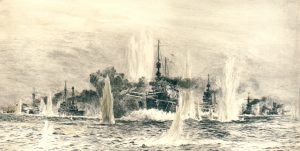From a humble middle-class family to the stern, no nonsense dictator of Italy, Benito Mussolini grew his following from the ground up. Mussolini’s campaign erupted on the current discontent with the Italian economy and political field. Italians felt Italy didn’t get justice in terms of territorial settlements at the end of WWI despite being on the winning side. Socialists and communists were fighting for their view of a future Italy, scaring many in the middle class. Italy was also hurting economically, as the Italian economy was stagnant after WWI. Many of those who were hit hardest by the economy were also in the middle class.1 However, there were many other moving parts as to why Mussolini came to power. Overall, individuals wanted to see a drastic and significant change in Italy, and to them, Mussolini was the answer.

In 1912, Mussolini was a young socialist involved in Italian politics. That same year Mussolini started editing for the prominent socialist newspaper Avanti!2 There he developed his views, and advocated against Italy joining WWI when it broke out in 1914. Mussolini did this to support the decision of the Italian Socialist Party, which had dismissed the war after a group of anti-militarist protesters were killed. However, thereafter he did a complete about-face and began strongly advocating for Italy’s entrance to the war in Europe. He saw the war as an opportunity for his own ambitions too. Two years later, after advocating for Italian participation in the war, Mussolini left the Socialist Party and began his own movement. At that point, Mussolini’s views underwent a complete change as well. Taking a break from politics, Mussolini volunteered and served with distinction on the Italian front in 1915. He was severely injured in 1917, and was forced to leave the war and the army.
When Mussolini returned to politics in 1917, he promoted nationalism, militarism, and the restoration of the bourgeois state. Mussolini did not like where Italy was heading in terms of its foreign policy and its domestic economy. Mussolini had the vision of returning Italy to the grandeur of the Roman Empire. Furthermore, he wanted to be like a modern-day Julius Caesar ruling over his nation. He could not sit around and watch Italy fall even further into a recession, or be pushed around by foreign powers. Mussolini began to promote his ideas in his newspaper, Il Popolo d’Italia.3 In 1919, Mussolini started surrounding himself with sympathetic minds, like General Emilio De Bono, Italo Balbo, Cesare De Vecchi, and Michele Bianchi, growing his following so he could create his own political party. As his organization broadened, his supporters started wearing black shirts to their rallies. In 1922, Mussolini found his opening into national politics. Blackshirt volunteers crushed a strike called for by trade unions, and in the process, his party began to gain the support of many Italians who found Mussolini’s nationalism appealing, mainly among the middle class. However, Mussolini was also supported by veterans, industrialists, and bankers. He urged his supporters to march to Rome with him, like the great Giuseppe Garibaldi did after he unified Italy in the nineteenth century.4 Mussolini stated that either his party, the Fascists, would be given power, or they would take it themselves by force.

In the months leading up to the march on Rome, Mussolini began taking action, preparing for what would happen after they went through with it. Mussolini placed Bianchi in charge of political matters, and the other three were to take charge of the military operations. This allowed Mussolini to be free and more flexible. The Blackshirts’ first objective was to seize the towns around Rome. After the towns were seized, fascist columns of Blackshirts were to converge on Rome. The official date of the march was to begin on October 24, 1922, at a rally in Napoli. As the days led up to the march, Luigi Facta, Italy’s Prime Minister, became increasingly worried about his position as Prime Minister of Italy. In a last-ditch attempt to protect his position, he ordered a proposal of martial law. The order would have placed the army in between the government and a fascist takeover. However, the order needed to be signed by King Victor Emmanuel III. After consideration, the King was not confident in the loyalty of his army and feared a revolt that would jeopardize his power. For that reason, he did not sign the order on October 29, which effectively forced Facta out, making Mussolini the new premier of Italy. On October 30, Mussolini arrived in Rome in a sleeping car with 30,000 Blackshirts following behind. He presented himself to the king by announcing, “Majesty, I come from the battlefield—fortunately bloodless.”5
- Ronald Sarti, “Fascism and the Industrial Leadership in Italy before the March on Rome,” Industrial and Labor Relations Review 21, no. 3 (1968): 400-5. ↵
- Charles Delzell, “Benito Mussolini: A Guide to the Biographical Literature,” The Journal of Modern History 35, no. 4 (1963): 340-44. ↵
- Christopher Hibbert, Mussolini: The Rise and Fall of II Duce (New York: Macmillan, 1987), 89-94. ↵
- Global Events: Milestone Events Throughout History, 2014, s.v. “Benito Mussolini Marches on Rome.” ↵
- Salem Press EncyclopediaResearch Starters, 2017, s.v. “Mussolini’s “March on Rome,” by Harold A. Schofield and John Quinn Imholte. ↵



20 comments
Saira Castellanos
Its completely insane to me how persuasive people can be. Its also completely insane how dumb people can be to be persuaded by such awful people like Mussolini. I have heard of Mussolini, but I dont really know much about him, so this was a very interesting article to read. I know people want what is best for their country, but it seems to me we always do it in the dumbest way possible.
Kimberly Simmons
Interesting topic. I never knew about this piece of history, so it’s quite nice that you uncovered it in the way that you did. Mussolini’s quest is one that was both selfish and prosperous – he was a persuasive yet powerful leader that got exactly what he wanted. In addition, the fact that he used newspapers to spread his political views was interesting, even more so because he worked for it.
Jose Figueroa
When new people come to power it’s always a wonder to see how they did it. Some seize it completely by force while others silently sneak there way in. It was interesting that Mussolini, did it kind of both ways. By spreading his ideas in the newspaper, he was able to garner the following that held him take over Italy. Even the way he took over by simply showing up was my favorite part. He knew what he wanted and got it.
Michael Thomas
I found this article interesting because of how Mussolini spread his influence to others in order to control Italy. Mussolini took advantage of his country’s situation by spreading his fascist influence though his own newspaper. I was amazed that he was able to take power without any bloodshed. After reading this article, I now understand that Mussolini was driven by a vision of him becoming the next Caesar.
Luis Morales
This was an interesting article. I always love learning about World War II, especially about Benito Mussolini because I don’t know that much about him. It was interesting to learn that Hitler and Mussolini used similar tactics to take over their countries. Both were apart of the military in World War I and both used the economic burdens of the country to their gain. Mussolini was able to persuaded his fellow citizens that his vision of Italy’s future was the right one.
Kayla Lopez
This was a very interesting article filled with facts I have yet to read about. The introduction was strong and made me want to continue reading. I knew that he was a very stern man who knew exactly what he wanted and knew how to get it. However, I did not know that one of the platforms Mussolini used to spread his message was threw his own newspaper, Il Popolo d’Italia.
Iris Henderson
I will never understand people who claim to care so deeply about the future of their country by taking advantage of it’s people for personal gain. Unfortunately that seems like the majority of politicians. I was suprised to learn that Mussolini worked for a paper and then used that to spread his political views. In retrospect, they should have probably gone with the martial law to eliminate him gaining power.
Samuel Stallcup
Mussolini seemed like one of the most strict dictators, and it was because he had a clear vision of what he wanted, and was very determined to get what he wanted: total control. I thought it was really interesting that he started working at a newspaper as well. It’s quite a humble beginning, and it was useful when he wanted to promote his ideas in his own newspaper. Great article.
Edgar Ramon
Thank you for this post, it left me wondering what ever happened to King Victor Emmanuel III. How much of a hold he had of power in Italy at the time, and how he either contributed, or went against Mussolini’s power grab. I understand that Mussolini and many of the Italian people may have wanted what was best for Italy, but they did completely go about attaining it the wrong way. Or at least they sided with the wrong people. I believe we often overlook the Italians in WWII, and honestly, I do not know much about their role in the war.
Caroline Bush
Interesting article! Its interesting to see how Mussolini began his infamous conquest before the events of ww2. Its also fascinating how Mussolini gained his power by being an opportunist who saw his opportunity in politics and used it to his advantage. This was a similar tactic Hitler used to gain his political power as well. Overall this was a detailed article about a man who committed so much evil during the war.